The Embassy of China in Nigeria and China Cultural Centre in Nigeria in conjunction with the China General Chamber of Commerce in Nigeria, on the 14th of January, 2023 staged the 2023 Chinese New Year Temple Fair ahead of the Chinese new year.
Stagged at the China Cultural Centre in Nigeria, Abuja, the event saw the Chinese community in Nigeria, members of the diplomatic community, invited guests, Nigerian government officials as well as students gathered to have fun.
The Chinese New Year
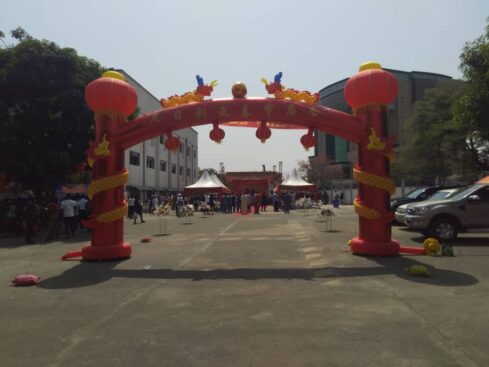
Chinese New Year is the festival that celebrates the beginning of a new year on the traditional Chinese lunisolar calendar. It was traditionally a time to honour deities and ancestors, and it has also become a time to feast and visit family members.
First, legend states that the Chinese New Year stemmed from an ancient battle against the Nian (which sounds the same as ‘year’ in Chinese), a terrifying beast that showed up every Lunar New Year’s Eve to eat people and livestock. To scare away the monster, people displayed red paper, burned bamboo, lit candles, and wore red clothes. These traditions have been continued until the present time.
- AFRIMA: Burna Boy, Davido, Wizkid, Asake win big at ceremony
- Abubakar Dahiru Mangal named Max Air CEO
Second, it is a celebration of the arrival of spring and the beginning of a new year on the Chinese lunisolar calendar.
The festival forbids certain activities which include, no sweeping or crying (to avoid throwing luck away), no clothes/hair washing (to avoid washing fortunes away), no eating of porridge for breakfast (to avoid being poor in the following year), no hospital visit, no black or white clothes, no needlework,.etc while some foods are being regarded as lucky foods and recommended for consumption on the festival day to attract future fortunes. These include fish, spring rolls, rice cake (Nian Gao), sweet rice balls (Tangyuan), and so on.
The Chinese New Year 2023 falls on Sunday, January 22nd, 2023, and celebrations culminate with the Lantern Festival on February 5th, 2023.
Year of the Rabbit
Chinese New Year marks the transition between zodiac signs: 2023 is the Year of the Rabbit. The sign of the Rabbit is a symbol of longevity, peace, and prosperity in Chinese culture. 2023 is predicted to be a year of hope.
Speaking at the 2023 Chinese New Year Temple Fair, the Chinese Ambassador to Nigeria, Ambassador Cui Jianchun, said there were different explanations about the Year of the Rabbit in Chinese translation. “I tried to find a way to say it. I think we can have a quick perception, quick thinking, quick understanding. I think that real perception, thinking, understanding demonstrate the courage of a rabbit.
“You are the year of rabbit, you bear this quality, you bear this character. And the second element that I think is important is its prudence. Rabbit is quick vision, rabbit is prudent by acting always, willing or showing or hearing or thought before the future. That is the way to avoid unnecessary risk. So, the rabbit has this quality by trying to avoid unnecessary risk.
“I think I should tell you first what is temple fair. It is a Chinese traditional culture where people always gather and bring festivals to the temple like churches, mosques and synagogues. Temple here means we have a big space to do a lot of functions. That is the reason we have temple fair,” he said.
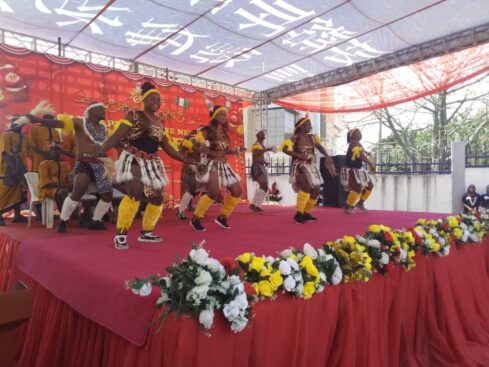
The five Fs
The Chinese envoy also used five “Fs” to describe the day’s celebration. “I will like to use five ‘Fs’ to categorise today. The first ‘F’ is festival, to bring festival, a lot of functions, music, films, movies.
“The second ‘F’ is Family. We have a family reunion. It is the most important occasion for Chinese people to reunite, to have a family reunion. Today’s family is Nigeria-China diplomatic corps.
“The third ‘F’ is about Friend. This occasion is a good time for friends to gather together and try to celebrate. The fourth ‘F’ is food. So, I hope this is a very important thing today. We have different kinds of Chinese cuisine. We have eight traditional Chinese cuisines today, you can enjoy it. The last is about the fun. I hope everybody has a good enjoyment and pleasure time.”
Just as the Chinese envoy admonished, there were a lot of “enjoyments” while the temple fair lasted. The tents where Chinese cuisine was served were overcrowded from the start of the programme at 10am to later in the evening when the event ended.
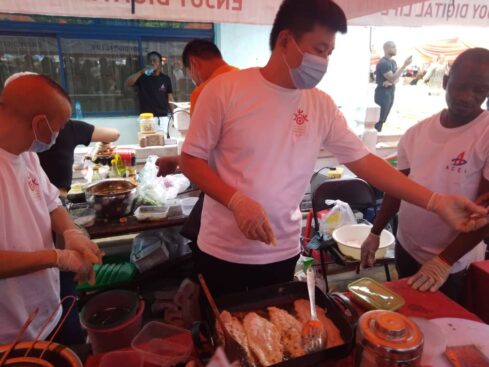
There was Chinese tea, Chinese donought, Chinese fish meal, spring rolls, rice cake (Nian Gao), sweet rice balls (Tangyuan) and noodles amongst others for the eating and drinking pleasure of those in attendance.
Some students sipping their Chinese tea told Daily Trust that they enjoyed their day. The three teenage girls who wouldn’t disclose their names said they enjoyed the music, food and drinks most.
Similarly, a woman in the company of her two children, who simply gave her name as Sandra, told Daily Trust that she was not “disappointed”. While expressing her love for the Chinses culture, especially the food and colours, Sandra said she brought her children to appreciate other cultures and have fun.
On two podiums were constant activities from dignitaries delivering their addresses, beautiful Chinese music to serenade the gathering, to local dance troops trilling the audience all day with majestic dance steps.
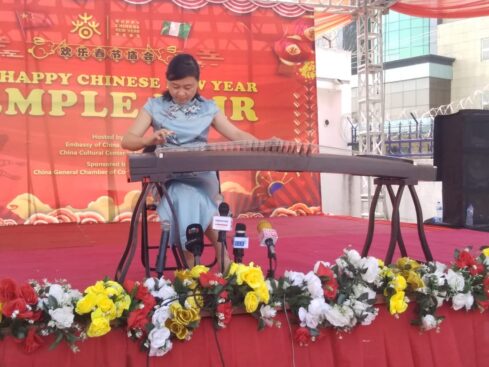
Gao Ju, a staff of Hilong Oil Engineering Industry Company, Abuja, thrilled the audience at the event with her mastery of the Guzheng instrument. The gathering applauded continuously while she played the instrument. Afterwards, she told Daily Trust that this period is important in the life of the Chinese, adding that it was a time to have fun with friends and family members.
There was also the dragon dance troupe whom the Chinese ambassador and Permanent Secretary, Ministry of Information and Cultures, Mrs Lydia S. Jafiya, joined to dance.
Since the dragon is a Chinese symbol of good fortune, a dragon dance highlights festival celebrations in many areas. This procession involves a long, colourful dragon being carried through the streets by numerous dancers. In this case, the dragon was only carried around within the Chinese Cultural Centre.
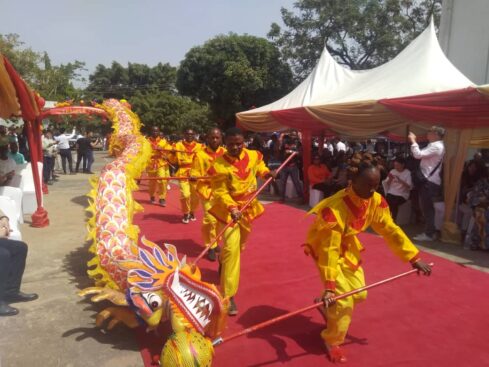
The Permanent Secretary, Ministry of Information and Cultures wrote “Peace” on the dancing dragon’s head while the audience applaud, though she didn’t say the reason she did that.
However, while presenting her address, Mrs Jafiya said she was extremely excited to be at the historic event, while appreciating the unflinching effort of the Chinese Ambassador to Nigeria and his team for bolstering the existing cultural relations between Nigeria and China through countless cultural exchanges, especially in capacity building.
She said Nigeria and China share close affinities in cuisines, hospitality and in festivals, adding that it was responsible for the rapid growth of the deep fraternal cultural cord between the two.
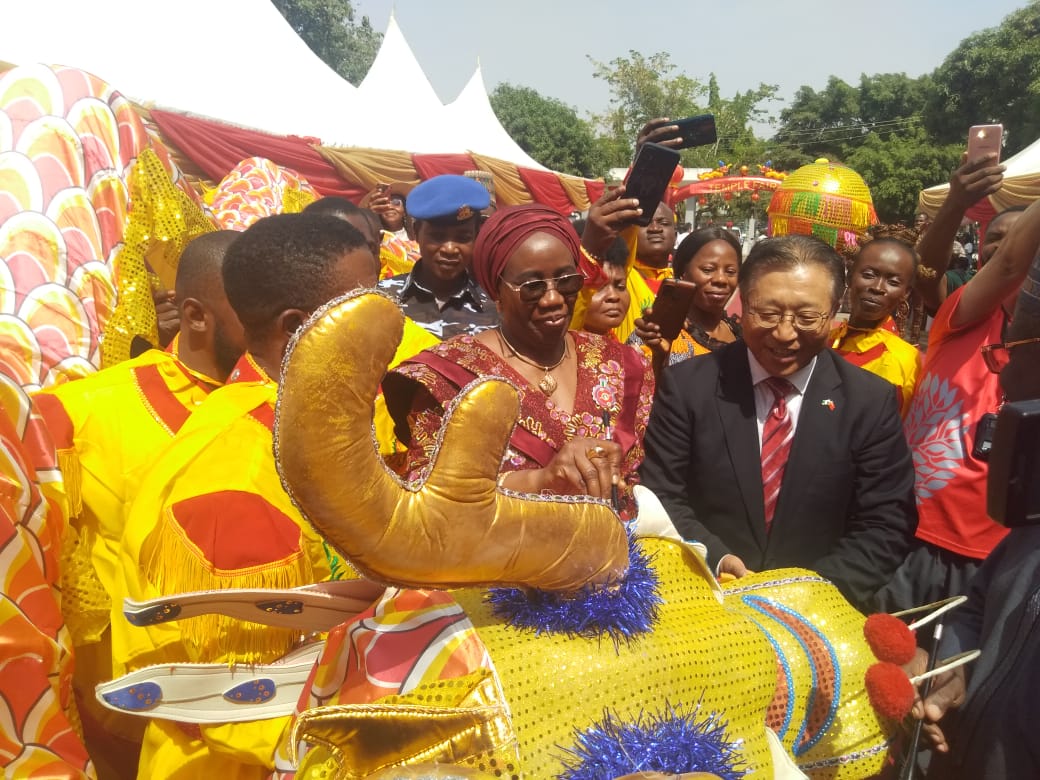
 Join Daily Trust WhatsApp Community For Quick Access To News and Happenings Around You.
Join Daily Trust WhatsApp Community For Quick Access To News and Happenings Around You.


